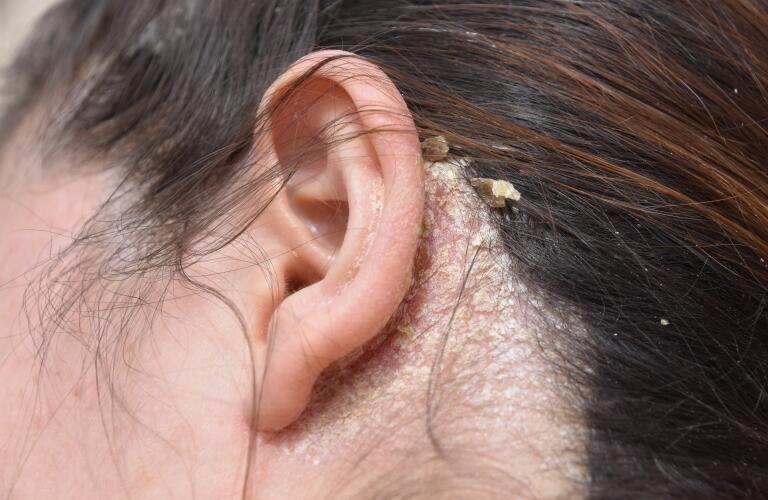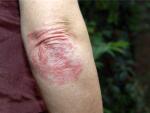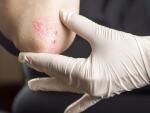
Psoriasis is a chronic skin condition caused by your immune system attacking healthy skin cells. Normally, over the course of a month, newly formed skin cells move to the top of your skin, then die and flake off, to be quickly replaced by new cells, and the cycle continues. If you have psoriasis, the life cycle of the skin cells speeds up to just a few days and the cells don’t have time to fall off. They build up on the skin surface, leaving psoriasis patches or spots, known as plaques.
Ear Psoriasis
Psoriasis is an autoimmune disease that isn’t contagious, nor is it the result of not washing properly. It can affect any part of your body covered with skin. As a result, it can also affect your ears. Plaques can form on the ear itself (including on the earlobe), behind the ear, and even in the ear canal. If psoriasis is in the ear canal, skin that flakes off inside the canal can combine with ear wax, creating a blockage that can result in temporary hearing loss.
Psoriasis Symptoms
Symptoms of psoriasis on the ears may not be as obvious as the red plaques that can affect other parts of your body. Instead, they may include:
Spots of irritated skin that may flake
Spots of dry or cracked skin, which may bleed
Decrease in hearing, caused by the build-up of dead skin cells in the ear canal
Red or silver plaques around the ear
Pain and itching in the ear
Psoriasis Treatment for the Ears
If you’ve already been diagnosed with psoriasis, you may be using steroid creams or ointments to treat plaques elsewhere on your body. However, the skin in and around your ear is sensitive and thinner than the rest of your body, so you should not automatically use these treatments to treat the itching or pain. The dosages may be too high or concentrated for the skin to tolerate. Ask your doctor if you can use them or if you need creams with a lower dose, or a different medication altogether. If the psoriasis is affecting your ear canal, you might use steroid drops rather than creams, as drops can enter the ear canal more easily. Other therapies like light therapy might also be recommended; however this too must be adjusted to compensate for the skin’s sensitivity.
Keeping your ears clean and the skin well moisturized may help relieve flare-ups and itching when plaques do appear. After washing your ears and the surrounding area with a gentle soap, pat dry gently—do not rub, as this may irritate your skin. Moisturizers, especially if applied right after bathing, can help keep your skin from drying out. Don’t scratch or rub too hard, despite the itching, to avoid breaking the skin. Some people find relief by applying some aloe vera to the plaques. Cool compresses may also help ease the itch.
There are several types of treatments for psoriasis, depending on its severity. If you have moderate to severe ear psoriasis that is affecting your quality of life, consider speaking with your doctor about more advanced psoriasis treatments. Medications such as methotrexate, cyclosporine, or biologics (medications that block certain reactions within your body) are taken by injection or intravenous (IV) infusion. These treatments affect your whole body and are generally only prescribed if all other treatments have failed.
Ear Psoriasis and Possible Hearing Loss
Excess ear wax and the shedding skin cells can cause a temporary loss of hearing. If this happens to you, your doctor or nurse may manually, painlessly remove the wax and excess skin using a special instrument. You may be tempted to try to remove flaking from your ear canal at home, but it’s important that you do not insert any objects into your ear, including swabs. You could damage your eardrum, resulting in permanent hearing loss. Your doctor may recommend you use a dropper to put warm olive oil into your ear regularly or before manual removal of the wax and skin cells. The olive oil helps keep the wax moist and makes it easier to remove.
Treatment for ear psoriasis is not much different from treating psoriasis elsewhere on the body, although there are some extra precautions due to the delicate nature of the skin in and around your ear. Speak with your doctor about what you can do to manage your signs and symptoms of psoriasis, especially if you feel your hearing may be not as acute as it should be.






























